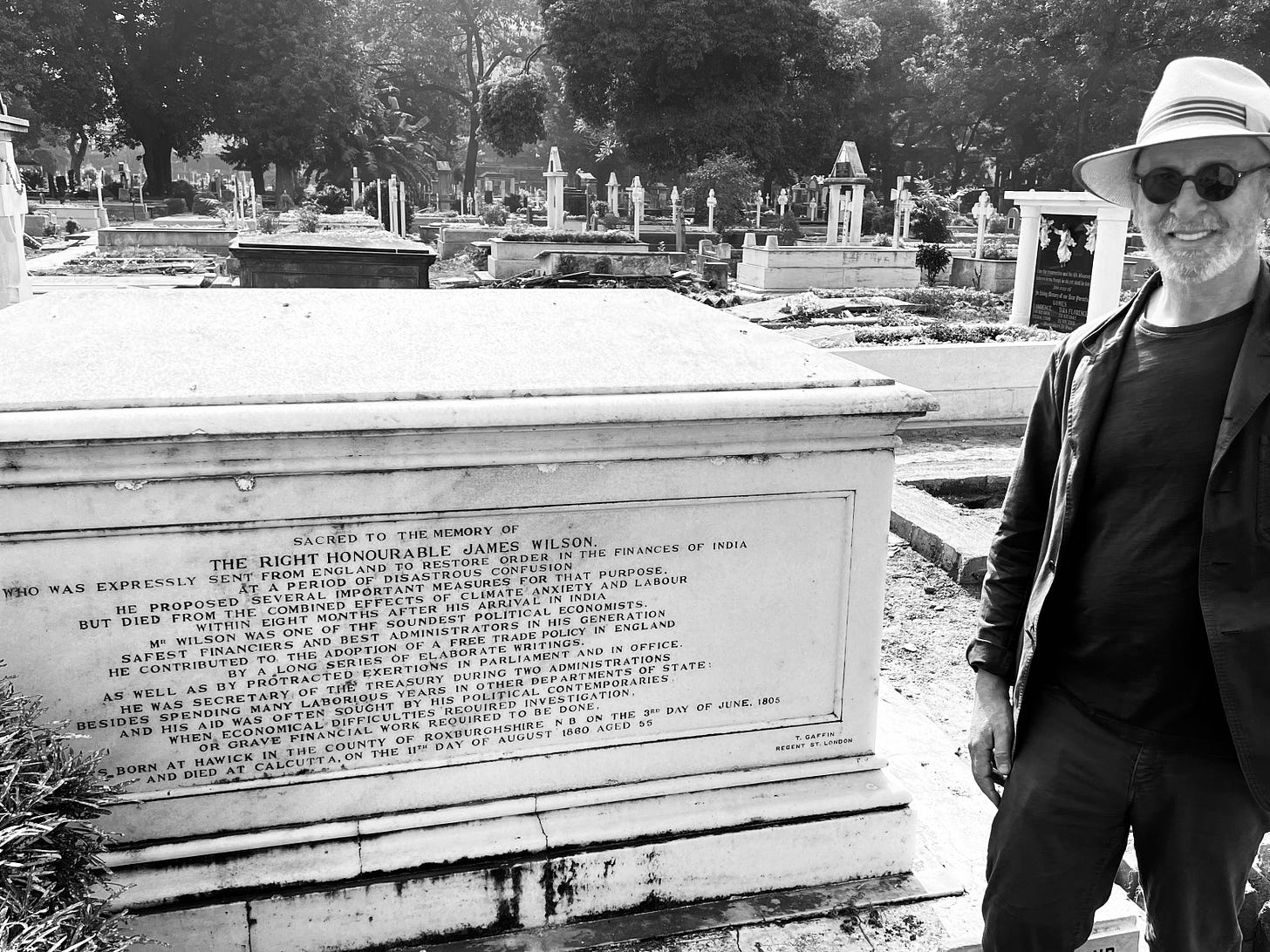India Business - Leaving (for a bit)
A column on my transition, and India's
Six years ago I arrived in India. Anyone with ties to The Economist has reason to be wildly optimistic about the impact they might have in the country. To see why, visit the rubble-strewn graveyards of Kolkata, formerly “Calcutta” and India’s colonial capital. There, a single grave in particularly good condition stands out (see above). It is for James Wilson, founder of The Economist and the Chartered (now Standard Chartered) bank, as well as, in 1860, the creator of India’s national income tax. They also have reason to be a little nervous. Four months after this great advance, Wilson passed away—a victim of what was described as “climate anxiety and labour”.
On the lower right-hand corner of Wilson’s tombstone is a plaque noting maintenance courtesy of the IRS, India’s tax-collection agency. Wilson is perhaps the only colonial figure with a continuing fan club, albeit one with a modest membership. He was, as noted in the chiselled epitaph, “sent from England to restore order in the finances of India at a period of disastrous confusion”. Good for him. Less good is that in the intervening years many in India have come to believe the country’s tax code has itself become a source of disastrous confusion or, to use the common phrase, “tax terrorism”. A position in the department Mr Wilson created is seen as a ticket for the unscrupulous to extract money for their own revenue rather than India’s.
As I prepared to leave India, I saw one way in which people respond to this disastrous confusion: they emigrate. Behind the local headquarters of Standard Chartered in Mumbai sits an American facility where thousands of people gather every day to apply for travel rights. After being injured in a motorcycle crash, and in need of assistance from an Indian friend on the way home, I had the curious privilege of participating in the process.
Petitioners sit on the dirty kerb clutching documents. When called, they are fingerprinted and their documents checked; if successful, they must return another day to queue with hundreds, and possibly thousands, of others outside the high, forbidding walls of the American consulate. There are no complaints because even reaching this point is difficult. Appointments are made via a crash-prone portal with almost incomprehensible requirements. Success means an appointment in March 2026.
To live in India, however, is to understand that this sort of chaos represents just the surface of a more interesting system; one that is, at turns, beguiling and maddening. Fraudulent sites resembling the American one prey on the confused. The ability to navigate these sorts of systems is essential to success in India. It is, for instance, widely believed in Mumbai’s elite circles that the skill possessed by the Ambanis, the country’s richest family, for traversing such systems extends to getting their visa applications processed quickly.
For non-Ambanis, an industry of software-adept locals exists to obtain the initial appointment and then move it along with either technological dexterity, influence or what appears to be magic. As an American, I return to my homeland merely by waving a passport. Standing in line with the applicants, I felt somewhat spoiled.
Plenty of Westerners in India become jaded. In my case, what offset any cynicism was the fact that the same talent which enables India to navigate dysfunctional systems is also enabling it to create new, better ones. The Mumbai I arrived in six years ago was a mess. A metro system was years behind schedule and remains incomplete. While walking to the main train station soon after arriving, I was too lazy to take an elevated bridge. Several hours later it collapsed, killing six people. In contrast, a new road around the city’s western coast has emerged quickly, as has a 22km-long bridge on the city’s eastern flank, connecting it to a soon-to-be-open airport on the city’s outskirts. Skeleton frames have become occupied skyscrapers. New technology hubs are emerging. It is now possible to get small scoops of ice cream delivered in a matter of minutes. To be in India is to see, and even taste, progress.
If I were to suggest one change on my way out, it would be to shine even greater light on these efforts by following the example of the IRS. Next to new projects should go plaques (or, on the ice-cream cups, labels) that list the names of all the people who contributed. India is now a country of builders. Such acknowledgements would highlight the hidden strength that is transforming disastrous confusion into order.



We need to hear from you!
Your analysis of India’s dynamic business landscape offers nuanced perspectives that are both informative and thought-provoking. The way you dissect complex economic developments resonates with my own explorations into the subtleties of market behaviors. It’s refreshing to find such depth in business journalism.